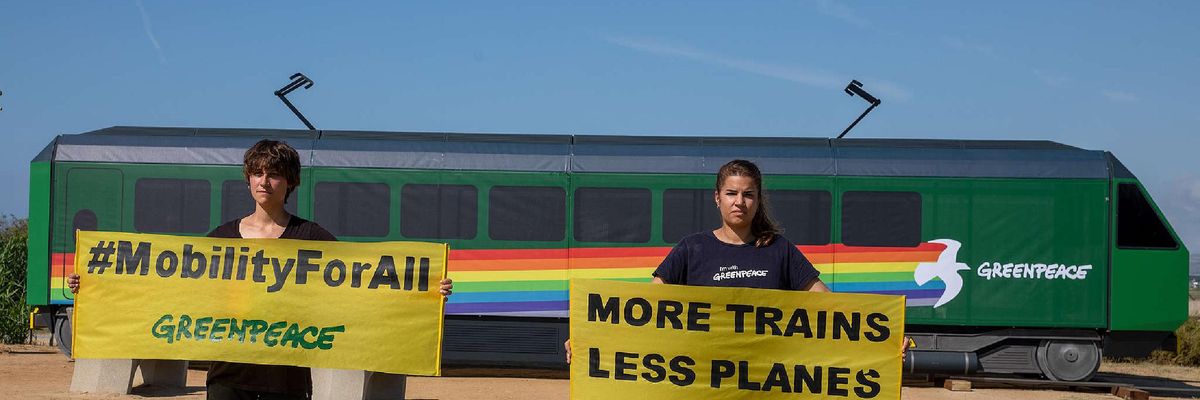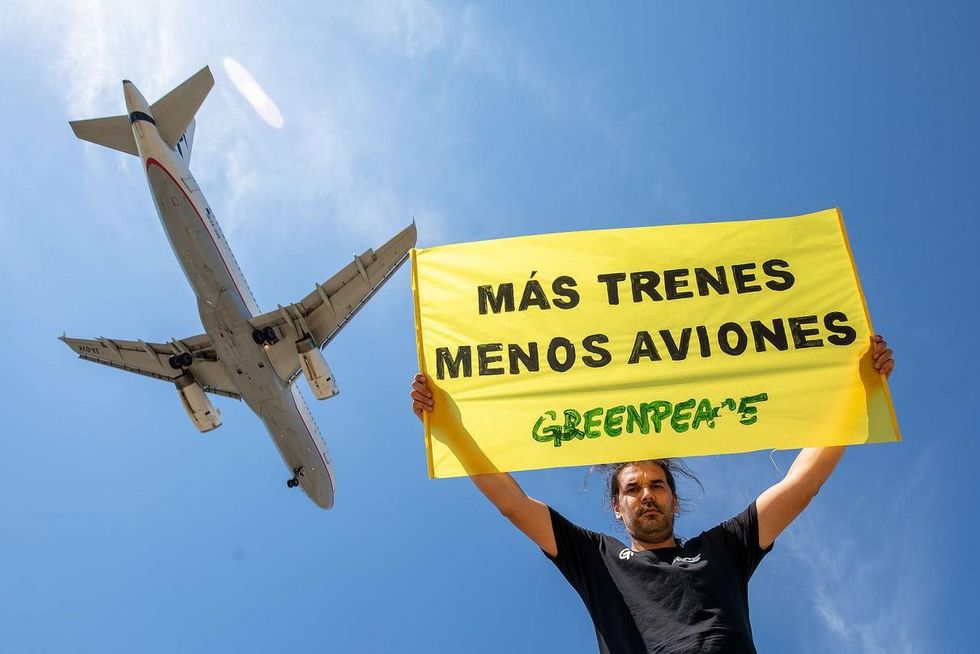
Greenpeace is demanding that European governments invest in an accessible railway system for all. The campaign got off to a 'flying' start with anti-expansion action at El Prat Airport. (Photo: Pablo Blazquez/Greenpeace)
To donate by check, phone, or other method, see our More Ways to Give page.

Greenpeace is demanding that European governments invest in an accessible railway system for all. The campaign got off to a 'flying' start with anti-expansion action at El Prat Airport. (Photo: Pablo Blazquez/Greenpeace)
Earlier this month, activists from Greenpeace Spain installed a 12-meter long train model in the Barcelona-El Prat Airport to protest the impact of the airline sector and the planned expansion of the airport.
The expansion of the Barcelona-El Prat Airport would cause tremendous damage to precious wetlands and cost 1.7 million euros. Businesses and representatives promoting this project would like people to believe that opposing the expansion will hurt the city and its inhabitants. It is not true. No city can prosper based exclusively on a "low cost" tourism model that negatively impacts the population with more expensive rents while devouring public resources.
This train model was designed to highlight the shocking lack of rail connectivity among European countries and across the continent. It will travel across Europe in the coming months.
Why it matters
With the arrival of summer in Europe, the easing of restrictions means a return to travel throughout the continent. However, of the people who are lucky enough to be able to travel, many folks have no choice but to resort to the car or plane for their vacations due to the lack of trains. We urgently need European governments to invest in a geographically robust and accessible railway system for everyone everywhere, not just those routes with the highest demand.
\u201cPollution from cars and planes is rising in Europe, but EU ministers today failed to back up their words with real commitments to action\n\nWe need to #TransformTransport and create #Mobility4All!\n\n#MoreTrainsLessPlanes\n\nhttps://t.co/knR6tHH3UL\u201d— Greenpeace EU (@Greenpeace EU) 1622726621
In Eastern and Northern Europe, for example, distances are big and alternatives still need to be designed and delivered. If Europe truly wants to be united, train travel time between places like Bucharest (Romania) and Sofia (Bulgaria), the capitals of the two largest countries in Eastern Europe, should be five hours, not 11 hours with multiple transfers.
Investing in trains is a key to fighting the climate emergency while connecting Europeans and other travelers with their cities and countries in a sustainable way. But diminishing connections has forced people to use more polluting means of transport.

Earlier this month, activists from Greenpeace Spain protested the planned expansion of the airport. (Photo: Pablo Blazquez/Greenpeace)
What needs to happen
The European Commission has declared 2021 the "European Year of Rail," highlighting the essential role of the train in fighting the climate crisis. Traveling by plane pollutes up to 20 times more than traveling by train. Greenpeace demands that E.U. institutions and national governments be consistent with their climate objectives and promote a system whereby the train--already climate-friendly, safe--is an affordable alternative to short-haul flights and the car.
With that in mind, Greenpeace Spain produced a video to encourage citizens to sign a petition addressed to European Transport Ministers with five proposals that would allow us to travel better in the future:
Mobility For All is working in collaboration with allies to promote the benefits of alternative mobility for improved city life for all city dwellers, whatever their background or socioeconomic status.
Trump and Musk are on an unconstitutional rampage, aiming for virtually every corner of the federal government. These two right-wing billionaires are targeting nurses, scientists, teachers, daycare providers, judges, veterans, air traffic controllers, and nuclear safety inspectors. No one is safe. The food stamps program, Social Security, Medicare, and Medicaid are next. It’s an unprecedented disaster and a five-alarm fire, but there will be a reckoning. The people did not vote for this. The American people do not want this dystopian hellscape that hides behind claims of “efficiency.” Still, in reality, it is all a giveaway to corporate interests and the libertarian dreams of far-right oligarchs like Musk. Common Dreams is playing a vital role by reporting day and night on this orgy of corruption and greed, as well as what everyday people can do to organize and fight back. As a people-powered nonprofit news outlet, we cover issues the corporate media never will, but we can only continue with our readers’ support. |
Earlier this month, activists from Greenpeace Spain installed a 12-meter long train model in the Barcelona-El Prat Airport to protest the impact of the airline sector and the planned expansion of the airport.
The expansion of the Barcelona-El Prat Airport would cause tremendous damage to precious wetlands and cost 1.7 million euros. Businesses and representatives promoting this project would like people to believe that opposing the expansion will hurt the city and its inhabitants. It is not true. No city can prosper based exclusively on a "low cost" tourism model that negatively impacts the population with more expensive rents while devouring public resources.
This train model was designed to highlight the shocking lack of rail connectivity among European countries and across the continent. It will travel across Europe in the coming months.
Why it matters
With the arrival of summer in Europe, the easing of restrictions means a return to travel throughout the continent. However, of the people who are lucky enough to be able to travel, many folks have no choice but to resort to the car or plane for their vacations due to the lack of trains. We urgently need European governments to invest in a geographically robust and accessible railway system for everyone everywhere, not just those routes with the highest demand.
\u201cPollution from cars and planes is rising in Europe, but EU ministers today failed to back up their words with real commitments to action\n\nWe need to #TransformTransport and create #Mobility4All!\n\n#MoreTrainsLessPlanes\n\nhttps://t.co/knR6tHH3UL\u201d— Greenpeace EU (@Greenpeace EU) 1622726621
In Eastern and Northern Europe, for example, distances are big and alternatives still need to be designed and delivered. If Europe truly wants to be united, train travel time between places like Bucharest (Romania) and Sofia (Bulgaria), the capitals of the two largest countries in Eastern Europe, should be five hours, not 11 hours with multiple transfers.
Investing in trains is a key to fighting the climate emergency while connecting Europeans and other travelers with their cities and countries in a sustainable way. But diminishing connections has forced people to use more polluting means of transport.

Earlier this month, activists from Greenpeace Spain protested the planned expansion of the airport. (Photo: Pablo Blazquez/Greenpeace)
What needs to happen
The European Commission has declared 2021 the "European Year of Rail," highlighting the essential role of the train in fighting the climate crisis. Traveling by plane pollutes up to 20 times more than traveling by train. Greenpeace demands that E.U. institutions and national governments be consistent with their climate objectives and promote a system whereby the train--already climate-friendly, safe--is an affordable alternative to short-haul flights and the car.
With that in mind, Greenpeace Spain produced a video to encourage citizens to sign a petition addressed to European Transport Ministers with five proposals that would allow us to travel better in the future:
Mobility For All is working in collaboration with allies to promote the benefits of alternative mobility for improved city life for all city dwellers, whatever their background or socioeconomic status.
Earlier this month, activists from Greenpeace Spain installed a 12-meter long train model in the Barcelona-El Prat Airport to protest the impact of the airline sector and the planned expansion of the airport.
The expansion of the Barcelona-El Prat Airport would cause tremendous damage to precious wetlands and cost 1.7 million euros. Businesses and representatives promoting this project would like people to believe that opposing the expansion will hurt the city and its inhabitants. It is not true. No city can prosper based exclusively on a "low cost" tourism model that negatively impacts the population with more expensive rents while devouring public resources.
This train model was designed to highlight the shocking lack of rail connectivity among European countries and across the continent. It will travel across Europe in the coming months.
Why it matters
With the arrival of summer in Europe, the easing of restrictions means a return to travel throughout the continent. However, of the people who are lucky enough to be able to travel, many folks have no choice but to resort to the car or plane for their vacations due to the lack of trains. We urgently need European governments to invest in a geographically robust and accessible railway system for everyone everywhere, not just those routes with the highest demand.
\u201cPollution from cars and planes is rising in Europe, but EU ministers today failed to back up their words with real commitments to action\n\nWe need to #TransformTransport and create #Mobility4All!\n\n#MoreTrainsLessPlanes\n\nhttps://t.co/knR6tHH3UL\u201d— Greenpeace EU (@Greenpeace EU) 1622726621
In Eastern and Northern Europe, for example, distances are big and alternatives still need to be designed and delivered. If Europe truly wants to be united, train travel time between places like Bucharest (Romania) and Sofia (Bulgaria), the capitals of the two largest countries in Eastern Europe, should be five hours, not 11 hours with multiple transfers.
Investing in trains is a key to fighting the climate emergency while connecting Europeans and other travelers with their cities and countries in a sustainable way. But diminishing connections has forced people to use more polluting means of transport.

Earlier this month, activists from Greenpeace Spain protested the planned expansion of the airport. (Photo: Pablo Blazquez/Greenpeace)
What needs to happen
The European Commission has declared 2021 the "European Year of Rail," highlighting the essential role of the train in fighting the climate crisis. Traveling by plane pollutes up to 20 times more than traveling by train. Greenpeace demands that E.U. institutions and national governments be consistent with their climate objectives and promote a system whereby the train--already climate-friendly, safe--is an affordable alternative to short-haul flights and the car.
With that in mind, Greenpeace Spain produced a video to encourage citizens to sign a petition addressed to European Transport Ministers with five proposals that would allow us to travel better in the future:
Mobility For All is working in collaboration with allies to promote the benefits of alternative mobility for improved city life for all city dwellers, whatever their background or socioeconomic status.